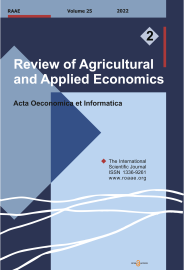KEYWORDS:
Adoption, Irrigation, Policy, Rice, Benin
DOI NUMBER:
10.15414/raae.2019.22.01.76-82
ABSTRACT:
Majority of the irrigation schemes developed in Benin failed upon the withdrawal of foreign partners in 1980s, and these schemes were abandoned by farmers. The 2008 food crisis and the new challenge of climate change and variability have renewed Benin government interest to invest in irrigation development to achieve food security. This article explores the policies needed for such investments to be successful and improve adoption of irrigation and farmers’ profitability using a case study from the rice irrigation scheme of Malanville, Benin. Results indicate that irrigated rice farming is profitable in Benin. Furthermore, profitability is positively correlated with education, access to credit, extension services, soil quality, amount of fertilizer and herbicide applied, and ownership of mobile phone. Policy reforms needed to sustain the development of irrigation and to increase profits include the development of irrigation policy document, the reinforcement of institutional supports for farmers, and the improvement in the production practices.
Please Cite this Article as:
Gbêtondji Melaine Armel NONVIDE (2019) Policy For Improving Adoption And Profitability Of Irrigation In Benin. Review of Agricultural and Applied Economics. XXII (Number 1, 2019): 76-83. doi: 10.15414/raae.2019.22.01.76-82
URL for sharing:
https://roaae.org/1336-9261/doi/abs/10.15414/raae.2019.22.01.76-82
FULL TEXT PDF:
▼ direct download link| view online in fullscreen ▲
References:
▼ direct download link

